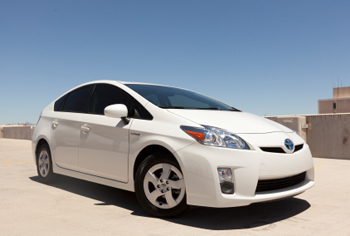Top Class Actions’s website and social media posts use affiliate links. If you make a purchase using such links, we may receive a commission, but it will not result in any additional charges to you. Please review our Affiliate Link Disclosure for more information.

Walter officially dismissed the Toyota Prius safety system class action lawsuit last week, when he ruled that plaintiffs Tae Hee Lee and Alan Quan showed no proof that they were harmed, or that the defendant company had misrepresented their product in any way.
Quan and Lee alleged in their class action lawsuit, filed in October 2013, that they had purchased their Prius vehicles under the impression that there was an added safety benefit in the particular models; both vehicles came with a collision avoidance system which was advertised to reduce the risk of automobile collision accidents. However, both plaintiffs claimed that these systems provided no safety benefits, and did not reduce the risk of collision.
The collision avoidance system, or the “pre-collision” system (PCS) as advertised, was a safety option that could be installed in various Toyota models, including the Prius V. The system was supposed to provide automatic braking when the vehicle’s radar system determines whether or not a frontal collision is unavoidable. Lee and Quan both stated that this system was ineffective in practice.
The plaintiffs stated in the class action lawsuit that it cost them an additional $5,000 to install the technology package with pre-collision system in their Toyota Prius models, as well as any other applicable Toyota models. According to purchase records, the pre-collision system only takes $1,000 of the additional cost.
Safety System Fails IIHS Crash Prevention Standards
The class action lawsuit stemmed from a study by the Insurance Institute of Highway Safety (IIHS), which had been reporting on detailed collision tests. The results indicated that the PCS in these vehicles, including the ones the plaintiffs bought, did not automatically reduce the speed of the vehicle in sufficient time to meet the requirements of the IIHS, to define itself as a front crash prevention system.
Out of the 47 Toyota models, only the Toyota Prius V and one Infinity model failed to qualify as a crash prevention system, according to the class action lawsuit. Despite the pre-collision system being marketed and sold by Toyota, the plaintiffs argued that it provided no additional safety to any consumer who purchased it.
Lee and Quan described the braking system as “negligible,” and argued that they paid an additional $1,000 for the safety feature, which increased the price of the vehicles by 15%, for a system that did not even work. They also stated that Toyota made false advertising statements about the collision system, because they were aware that the braking system did not meet up to IIHS’ standards.
Quan and Lee state that they would not have paid for the PCS if they had known it did not work, so they sued Toyota for compensation. This included the pre-collision system they paid for, diminished value of their vehicles, and other damages.
Plaintiffs Lack Standing
Despite the combined efforts of the plaintiffs, Judge Walter found that neither of them had the grounds to allege their charges, because they had reported no injuries or actual collisions. Additionally, both plaintiffs admit that the vehicles they purchased did slow down when the system was activated, albeit not as quickly as advertised.
“Plaintiffs do not have a bargained-for benefit claim based on the extent of performance of the PCS in the absence of a claim that Toyota made representations about the amount or extent of speed reduction provided by the PCS,” Walter wrote in his Jan. 9 decision.
Walter’s decision on the case has essentially dismissed the class action lawsuit and all charges along with it; he also addressed Toyota’s other grounds for dismissal. Lee and Quan also had claims of fraud and violations against the California’s Consumer Legal Remedies Act; both of these arguments failed because they failed to identify the specific misrepresentation from Toyota about the performance of the braking system.
“Plaintiffs have not alleged that they saw, read or in some way relied on a statement by Toyota promising that the pre-collision braking feature in their Prius’ PCS would operate at a particular level of efficiency, or that it would conform to any particular standard, much less the private IIHS criteria,” Walter wrote.
The plaintiffs are represented by Richard D. McCune and Jae K. Kim of McCuneWright LLP, Daniel H. Chang of Diversity Law Group and Edward W. Choi of Law Offices of Choi & Associates.
The Toyota Prius Safety System Class Action Lawsuit is Tae Hee Lee, et al. v. Toyota Motor Sales USA Inc., Case No. 1:3-cv-7431, in the U.S. District Court for the Central District of California.
ATTORNEY ADVERTISING
Top Class Actions is a Proud Member of the American Bar Association
LEGAL INFORMATION IS NOT LEGAL ADVICE
Top Class Actions Legal Statement
©2008 – 2024 Top Class Actions® LLC
Various Trademarks held by their respective owners
This website is not intended for viewing or usage by European Union citizens.














